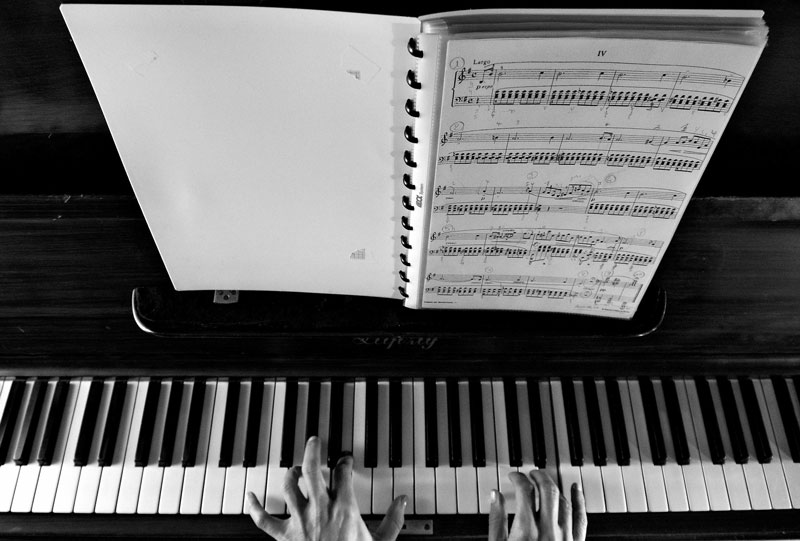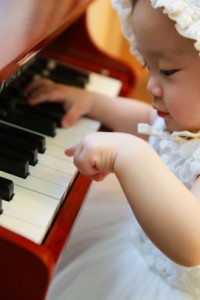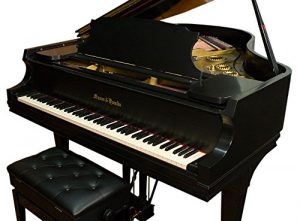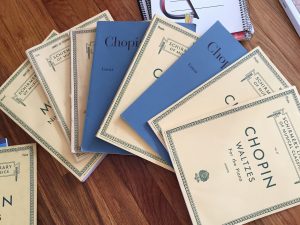The best age to start learning music is whenever you want to learn.

If you’re wondering when to start music lessons, the time is now! The best age to start learning music is whenever you want to learn. The fact that you’re even asking this question shows that you’re interested, and desire is the best motivator to success. As far as knowing whether you’re “too old to learn music” or whether your child is “too young to start piano lessons”, it’s my opinion that learning music is for all ages. Why should the joys of learning music be limited to select audiences? Anyone who is interested and determined can succeed, and indeed, I’ve seen 2-year-olds and grandparents both succeed in learning music. Age matters less than desire, attentiveness, and discipline, and desire is the most important. Attentiveness and discipline can always be learned, so if the desire is there, then it’s time to consider lessons.
Hold Old is Too Old to Start Learning Music?
 Believe it or not, you’re never too old to learn something new. To say that “you can’t teach an old dog new tricks” is just a stubborn man’s determination to make excuses for himself. If you genuinely want to learn and are willing to practice, then you can do it, no matter how old you are. The fastest-growing age group of new pianists is actually those age 25 or older. Many beginner pianists are older than 40. Playing piano, singing, playing flute, or playing any other instrument is a great skill no matter when it’s learned. For older individuals, it’s a great way to keep the mind sharp and to utilize your free time after the kids have moved away. If you’ve spent your whole life wishing you could learn to play piano or learn to sing, stop sitting around dreaming and schedule lessons today! There’s no better time to learn than now.
Believe it or not, you’re never too old to learn something new. To say that “you can’t teach an old dog new tricks” is just a stubborn man’s determination to make excuses for himself. If you genuinely want to learn and are willing to practice, then you can do it, no matter how old you are. The fastest-growing age group of new pianists is actually those age 25 or older. Many beginner pianists are older than 40. Playing piano, singing, playing flute, or playing any other instrument is a great skill no matter when it’s learned. For older individuals, it’s a great way to keep the mind sharp and to utilize your free time after the kids have moved away. If you’ve spent your whole life wishing you could learn to play piano or learn to sing, stop sitting around dreaming and schedule lessons today! There’s no better time to learn than now.
How Young is Too Young to Start Learning Music? How Old Should My Child Be to Start Learning Music?
Most children start with piano lessons, and as a general rule, many piano teachers won’t take on students younger than age 5 or 7. But as a professional music teacher myself, I do not set an age limit! I think children as young as 2 or 3 years old can definitely be capable of learning music, and as a teacher I want to give everyone the chance. Young children deserve the opportunity to learn music if they desire, and they are more than capable of learning to sing songs, develop fine motor skills, and learn rhythms and beats. In fact, it’s been proven that music education produces countless benefits for young children including enhanced brain function, higher IQ, problem solving skills, emotional skills, and more, not to mention the creative skills, performance skills, and talent development that are directly related to music education.
Still, when young children are learning music, there are several factors to consider:
Physical Size
In a previous blogpost, I talked about how physical limitations can sometimes affect what a child can learn. Very young children cannot necessarily carry, hold up, or reach all the parts of certain instruments. But while this is important to consider, don’t let it prevent your child from ultimately learning what he wants to learn! Even if it may be physically difficult to play something, if it’s possible and he’s motivated, he can do it. Just recognize that a little extra work may have to go into it for a while, or start him on piano first before tackling the cello or bassoon.
Intellectual Understanding
Some intellectual understanding is important when learning music. An understanding of “right” versus “left” and an ability to recognize “up” and “down” is necessary, but even without a perfect understanding of these things, children can still learn with the help of a patient teacher. Additionally, knowing the alphabet (at least letters A through G) will prove important for learning to read music.
Attentiveness and Discipline
As I said before, desire matters more than attentiveness and discipline. Genuine interest is the most promising indicator that a music student will succeed. However, as with any kind of “lesson”, music lessons are formal education. They require focus and “homework” (mostly practicing). Some children will struggle with this until they are old enough to go to school, where it will become a regular part of their life. Other children will learn to do this in music lessons and be better prepared for the attentiveness and discipline of formal education. During a music lesson, children who are very young may be easily distracted, and they may forget what they’re learning. In this case, it helps if a parent sits in on the lessons to help their child remain focused and to be a second set of ears to remind their child what the teacher taught them during the lesson. It’s also important for parents to help their young ones remember to practice. As a teacher I am typically only with my students once a week, and if the student is not practicing on the other 6 days a week, it makes our lessons harder and their progression slower. Thank you, parents, for helping your children remember to practice!
Can 2- or 3-year-olds REALLY learn music?
Of cour se they can! If your child can imitate you, if she sings along to her favorite song, or if she’s always banging on the piano in your living room, she could be ready for lessons. If your child can learn to speak English, he can learn to speak and play the language of music. And if your child is learning to read books, she’s more than capable of learning to read music. Parents who want to encourage their children to one day learn music should expose them to music as early on as possible, especially live music.
se they can! If your child can imitate you, if she sings along to her favorite song, or if she’s always banging on the piano in your living room, she could be ready for lessons. If your child can learn to speak English, he can learn to speak and play the language of music. And if your child is learning to read books, she’s more than capable of learning to read music. Parents who want to encourage their children to one day learn music should expose them to music as early on as possible, especially live music.
Personally, I started formal piano lessons around age 3. My mom is a piano teacher and there were always students in the house, so I quickly picked up on it. I also had an innate desire to play piano all the time. I don’t remember a time where I couldn’t read music — I’ve known how to read music as long as I’ve known how to read books. Your child’s path to learning music is largely determined by his desire to learn and by his and your willingness to make it happen by scheduling music lessons now.


